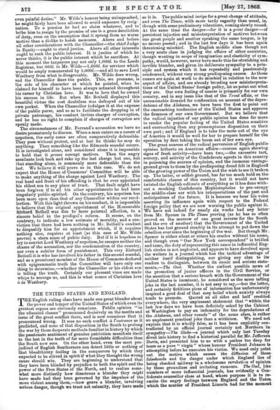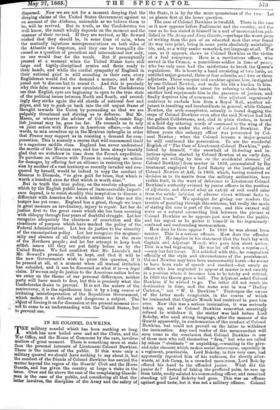THE UNITED STATES AND ENGLAND.
THE English ruling class have made one great blunder about 1 the power and temper of the United States of which even its greatest organs are obviously conscious. Public opinion " in the educated classes" pronounced decisively on the merits and issue of the great conflict there, and is now conscious that it pronounced wrong. It sees no such conflict a outrance as it predicted, and none of that disposition in the South to prolong the war by those desperate methods familiar in history by which the passionate sentiment of genuine patriotism manifests itself to the last in the teeth of far more formidable difficulties than the South now sees. On the other hand, even the most pre- judiced of English Southerners can detect little or nothing of that bloodthirsty feeling in the conquerors by which they expected to be stirred in spirit if what they thought the wrong cause should win. They are beginning to understand that they have been blinded by prejudice to both the spirit and the power of the Free States of the North, and to realize some- what more distinctly how disastrous a blunder they might have made had they been governed by the impulses of the more violent among them,—how grave a blunder, involving serious danger, though we trust not calamity, they have made as it is. The public mind is ripe for a great change of attitude,. and even The Times, with more tardy sagacity than usual, is, though with some preliminary vibrations, coming slowly round. At the same time the danger—for it is a great danger—of persistent injustice and misinterpretation of motives between one great people and another speaking the same tongue, is by no means passed ; and in the last few days it has been again threatening mischief. The English middle class though not a very acute class in judging the affairs of other countries,_ though wanting in scope of imagination and elasticity of sym- pathy, would, however, never have made this far-stretching and terrible blunder, and given its deliberate sympathy to a prin- ciple and system which it has repeatedly and passionately condemned, without very strong predisposing causes. As those- causes are again at work to do mischief in relation to the new aspect of affairs, and are already breeding new misinterpreta- tions of the United States' foreign policy, let us point out what they are. Our own feeling of course is primarily for our own country, and in any issue like that of the Trent affair, or the unreasonable demand for confiscation on account of the depre- dations of the Alabama, we have been the first to point out the encroaching tendencies of the United States and approve the firmness of our own Government. But we believe that the radical injustice of our public opinion has done far more- to render the popular feeling of the United States sensitive and encroaching than any presumptuous disposition on their own part ; and if England is to take the mote out of the eye of America it would be well for her to prepare herself for the operation by first taking the beam out of her own eye.
The great sources of the radical perversion of English public opinion hitherto on American affairs—sonrces again showing signs of fresh activity—have been two,—the excessive tact, secrecy, and activity of the Confederate agents in this country in poisoning the sources of opinion, and the immense vantage- ground given to them by the predisposing dread felt in England of the growing power of the Union and the wish to see it broken up. The latter, or selfish ground, has far too much hold on the- comfortable classes of this country, but it would not have- twisted the English estimate of everything as it has done with- out a mocking Confederate Mephistopheles to pre-occupy the middle-class ear with his interpretations of the past and anticipations of the future. It is because we hear his voice asserting its influence again with respect to the Federal foreign _policy that we are now warning the public against it. We have not indeed for nearly six weeks had any letter-- from Mr. Spence in The Times proving (as he has so often proved on the morrow of one great reverse for the South and the eve of another) that the Government of the United States has lost ground steadily in its attempt to put down the rebellion ever since the beginning of the war. But though Mr. Spence is either silent or utters his oracles without his name, and though even " Our New York correspondent" is bridled and tame, the duty of representing this cause in influential Eng- lish circles is not neglected, and appears to have devolved upon the writers in a journal which has the tactical advantage of neither itself distinguishing, nor giving any clue to its readers to distinguish, between its comic and serious state- ments,—The Owl. Whether the earliest possible news of the promotion of junior officers in the Civil Service, or the assertion that a serious breach with the Government of the United States is imminent, be considered as the more telling joke in the last number, it is not easy to say,—but the latter, and certainly fictitious piece of information has unfortunately inspired a good deal of that easy belief which anxiety always tends to promote. Quoted on all sides and half credited everywhere, the very unpleasant statement that " within the last few days we have been definitely asked by the Cabinet at Washington to pay an indemnity for the depredations of the Alabama, and other vessels " of the same class, is rather- an unpleasant practical joke than a witticism. We need not explain that it is wholly false, as it has been explicitly con- tradicted by an official journal certainly not Northern in sympathy—The Globe—a journal which only last Tuesday dived into history to find a historical parallel for Mr. Jefferson Davis, and presented him to us with a pathos too deep for tears as a pure " virgin " whose honour President Johnson is attempting before he executes his victim. We need only point out the motive which causes the diffusion of these• falsehoods and the danger under which England lies of being checked midway in a wholesome revolution of opinion by these groundless and irritating rumours. The Owl, like- numbers of more influential journals, has evidently a Con- federate counsellor close at hand, whose purpose it is to re- excite the angry feelings between England and the Union which the murder of President Lincoln had for the moment dispersed. Now we are not for a moment denying that the sleeping claims of the -United States Government against us on account of the Alabama, untenable as we believe them to
be, will be revived. But in truth, as the Confederates too well know, the result wholly depends on the moment and the
manner of their revival. If they are revived, as Mr. Seward wished that they should be, in some time of calm, when the mutually injurious misrepresentations on both sides of the Atlantic are forgotten, and they can be tranquilly dis- cussed as a question of precedent and international law only,
no one would fear for the result. But if peremptorily pressed at a moment when the United States have still large and highly-disciplined armies and fleets ready to their hands, and while the cordial sympathy of England in their national grief is still sounding in their ears, every Englishman would feel the demand a menace, and be dis- posed not to discuss but to resent it. And this is precisely why this false rumour is now circulated. The Confederates see that English eyes are beginning to open to the true state of the political issues between North and South, and accord- ingly they strike again the old chords of national fear and pique, and try to push us back into the old unjust frame of thought towards the Union by persuading us that we are palpably threatened and stirring us to defiance. But Mr. Mason, or whoever the adviser of this darkly-comic Eng- lish journal may be, goes too far. He counsels us to rely on joint action with France in American affairs, in other words, to mix ourselves up in the Mexican imbroglio in order that France may support us in resisting a demand for com- pensation. This is scarcely a course that will recommend itself to a sagacious middle class. England has never understood the merits of the Mexican case, and has been always heartily glad that we withdrew in time from the French expedition. To purchase an alliance with France in resisting an action for damages, by offering her an alliance in resisting the inva- sion by another of a vast territory so recently invaded and con- quered by herself, would be indeed to copy the conduct of Glaucus to Diomede, "to give gold for brass, that which is worth a hundred oxen for that which is worth nine."
But in truth the true policy, on the resolute adoption of which by the English public issues of immeasureable import- ance depend, is to resist steadily this temptation to discuss a differende with America for which neither the time nor the teMpei has yet come. England has a great, though we trust in great measure an involuntary, injury to repair. Let her do justice first to the great cause which she has been covering with obloquy through four years of doubtful struggle. Let her recognize adequately the clearness of conviction and the steadiness of 'purpose which have marked the policy of the Federal Administration. Let her do justice to the sincerity of the emancipation policy. Let her recognize the magnani- mity and absence of all vindictive sentiment in the mass of the Northern people ; and let her attempt to keep back selfish issues till they are put fairly before us by the United States. We feel confident that Mr. Lincoln's and Mr. Seward's promise will be kept, and that it will be the new Government's wish to press this question, if it be pressed at all, at a moment when all mutual irritation has subsided, and it can be discussed as what it is—a legal claim. If we can only do justice to the American nation before we enter on the theme of our personal differences, neither party will have much to fear, but this is precisely what the Confederates desire to prevent. It is not the' nature of the controversy, it is the significance lent it by a long course of irritating misinterpretation of the Republican Government, which makes it so delicate and dangerous a subject. The led of forcing it on for discussion at the present moment is— no to come to an, understanding with the United States, but to prevent one.



































 Previous page
Previous page